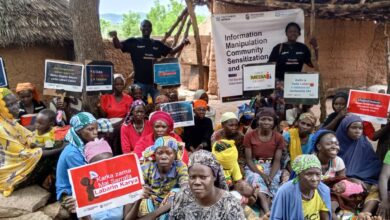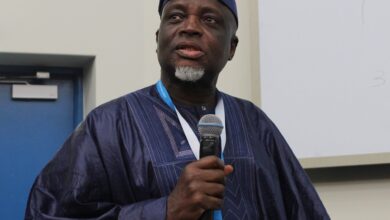
- Knowledge is power
- The Future Of Possible
- Hibs and Ross County fans on final
- Tip of the day: That man again
- Hibs and Ross County fans on final
- Spieth in danger of missing cut
By Ibraheem Muhammad Mustapha
In a recent two-part article (here, here), Factcheck Africa’s Mustapha Lawal delved into the upcoming elections of 2024, highlighting the significant stakes involved, with approximately 64 countries, including Senegal, gearing up for regional, legislative, and presidential elections. As Lawal reported, Senegal will in February “anticipates a new leader following constitutional term limits,” with President Macky Sall stepping down after two terms.
However, in a surprising turn of events, Senegalese President, Macky Sall announced on February 4th the indefinite postponement of the presidential elections originally slated for February 25th. This decision, made just hours before the official campaign kickoff, was, according to the Guardian, attributed to a “dispute between national assembly and the constitutional court over rejection of candidates”. “I will begin an open national dialogue to bring together the conditions for a free, transparent and inclusive election,” Sall emphasized.
The announcement sparked protests, leading to clashes between protesters and security forces. In response, the government imposed restrictions on internet access, citing the dissemination of “hateful and subversive messages” on social networks as a threat to public order, as stated by the Ministry of Communication, Telecommunications, and Digital Economy, Mr. Moussa Bocar THIAM.
Analysts have raised concerns about the potential impact of this development on West Africa’s stability, particularly amid a recent surge in coups and threats to democratic institutions across the region. Consequently, both regional and international entities, including ECOWAS, the African Union, and the U.S. Department of State, have called for a swift resolution, emphasizing the need for transparent, inclusive, and credible elections.
Despite the concerns raised, historical trends reveal a persistent inclination among Senegal’s leaders to exceed prescribed term limits. Notably, Senegal has earned recognition as the region’s most stable democracy, having avoided coups d’état and facilitated peaceful transitions of power since gaining independence in 1960. These transitions occurred first in 1980, transitioning from Leopold Senghor to Abdou Diouf; then in 2000, from Diouf to Abdoulaye Wade; and most recently in 2012, from Wade to the incumbent president, Sall.
Despite the regularity of elections, evidence suggests a consistent pattern of leaders attempting to prolong their tenures beyond designated limits. Leopold Sedar Senghor, Senegal’s inaugural president post-independence, initially rose to power on the strength of his reputation as an intellectual figure within the “négritude” movement and as a democratic critic of French colonialism. However, he resorted to presidential plebiscites in 1963, 1968, 1973, and 1978 to extend his stay in office. Ultimately, in December 1980, after 22 years in power, Senghor voluntarily stepped down, handing over leadership to his chosen successor, Abdou Diouf.
Abdou Diouf faced similar temptations during his tenure. He clung to the presidency until sustained democratic opposition led by Abdoulaye Wade compelled him to concede defeat in the 2000 election. Wade, after enduring imprisonment during his quest for power, went on to lead a popular movement that ousted the long-ruling Socialist Party and Diouf. Despite initially promising leadership, Wade, toward the end of his second term in 2009, mirrored his predecessors by attempting to secure a third term. Failing in this endeavor, he attempted to install his son, Karim Wade, as his dynastic successor, only to see Karim convicted of corruption, thus thwarting his father’s aspirations.
In 2012, Macky Sall assumed power through his party, the Alliance for the Republic. However, recent developments, particularly his attempt to indefinitely postpone elections, suggest a continuation of the trend observed in his predecessors. This observation persists despite Sall’s repeated assertions of not seeking a third term.
Where do we go from here?
The current situation raises questions about the future trajectory of Senegal’s democracy. Despite its reputation as one of the region’s most stable democracies, characterized by peaceful transitions of power since independence, recent events cast doubt on the sustainability of this democratic tradition. President Sall’s actions, including the indefinite postponement of elections, hint at a potential departure from the principles of democratic governance.
The resolution of these issues will profoundly shape Senegal’s political landscape and its democratic legacy moving forward. As Douglas Yates, a professor of political science, notes in his recent article published by the Conversation, “In my view, Senegal is a consolidated democracy. It has passed through three peaceful democratic transitions of power from a ruling party to the opposition. The optics of the present moment are certainly not good,” Yates acknowledged. The professor however provides a reassuring perspective, noting that “past experience suggests a new president could still come to office, either from the ruling party or from the opposition.” This perspective underscores the resilience of Senegal’s democratic institutions and offers hope for a positive outcome amid current challenges.




Hi, this is a comment.
To get started with moderating, editing, and deleting comments, please visit the Comments screen in the dashboard.